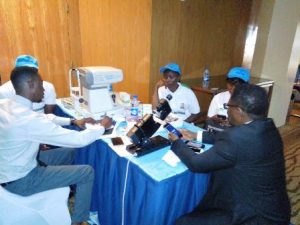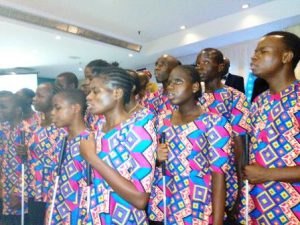A project that will put 1.5 million Nigerian children with eye impairment and related conditions on treatment has been launched in Abuja, Nigeria’s capital.
The programme, which started in 2017 will run through January 2020.
11 states in the country are to benefit from the programme, and will ensure affected children in hard-to-reach communities are reached.
The states are Oyo, Ogun, Osun, FCT, Nasarawa, Plateau, Kano. Others are Katsina, Jigawa Cross River and Akwa Ibom States.
Tagged “Seeing is Believing (SIB) a Comprehensive Child Health Care in Nigeria (CCHCiN) the intervention is funded by Standard Chartered Bank, UK, through the International Agency for Prevention of Blindness (IAPB), and implemented by Christoffel Blinden Mission (CBM) and other partners.
Speaking at the launch on Wednesday, Chairman of the occasion, Fatima Kyari, a consultant opthamologist and Chairperson of West-Africa sub-region of International Agency for the Prevention of Blindness, IAPB, said the programme started as office staff give-back in Standard Chartered Bank, decades back.
“I will like to say congratulations to Nigeria on this, to IAPB, to CBM, to Brien Vision Institute, to all our partners and our professional bodies to make this happen through innovations. Innovations, not just of the products that we make, but in our way of doing things; to share ideas, working towards a common goal, common agenda and unlocking the difficulties we find ourselves in, especially, in Africa.
“The devotion, the determination, I have partnered with CBM in various fora on child health in the past 20 years in Nigeria. We applaud them for taking this noble programme forward.
“Together with the notable partners, Brien Vision, the Seeing is Believing and our own partners, everybody is informed; most importantly, the leadership in Nigeria, Honourable Ministers of the various ministries that are involved, Health, Education, Social Development.”
Kyari, who holds PHD in public health added: “We can come all the way. In 2005 to 2017, I was involved in National Eye Health Survey. I went to all the nooks and crannies of this country, because we wanted to know what our problem in eye health was.
“We went to over 310 communities, most of them rural, about 70%. We did other things, but one of the things I was interested in was that we would ask the children if there was any child in these communities that couldn’t see. Immediately, they would take us to the doorstep of that child.
“My point here is: our children are visible in our communities. They are bright and shinning. We have the moral obligation to do something for them. Thus the child eye health programme in Nigeria is trying to make available and accessible, the whole spectrum of eye health care to the child. That is from promotion, detection, treatment and rehabilitation at levels of care.”
Chief Executive Officer, CBM, Christy Smith, said the organization works in 45 countries around the world, reaching 30 million people every year. “But, it is impossible for us to do that without many of the parties that we see before us today. I want to start by saying a huge thank you. This programme is completely unimaginable without the work of Standard Chartered.
She said the bank had raised about $100 million in 20 years for its humanitarian projects, and that her organization is proud to work with the bank.
“All of the bank’s work is channeled through IAPB, and they give us guidance, support and advice. We could not do this work without them,” she said.
She added: “We have two years to achieve a huge programme to reach 1.5 million children. So, we need the local partners who are sitting in this room, you are the ones to make it work.”
According to her, many achievements have been made in eye health for children over the last two years, and there are still so much to do. “That is what this project is hoping to achieve. We’ve seen improvement in the implementation…there is still massive progress to be made in cataract surgery,” she explained.
She urged Nigerian government to have dedicated budget line for eye health, as according to her, the project ends in two years and should be driven thereafter by the government.
She also called for sensitization of communities on need to prevent eye disease and present people with eye disease for medical care.
In her remarks, Africa Finance Manager, Brien Holden Vision Institute, Mrs Lina Govender, said: “We always note, and keep in mind that government is, and remains custodian of service delivery. As such, we ask government to work side by side with them in this aspect, particularly, eye health services.
“Bien Holden Institute believes the only way to address this enormous burden of avoidable blindness and visual impairment is to collaborate and partner with other NGOs, corporate organizations and government. This project is a true reflection of that collaboration. We thank CBM and Standard Chartered Bank for this collaboration.
She explained that an estimated 253 million people live with vision impairment worldwide, of which 36 million people are blind. She noted that there is so much to be done to address the problem.
“Our Africa Regional Director has a favorite saying: ‘if you want to go first, go alone, if you want to far, go together. I believe we have started the journey of going far in addressing this burden.
“Brien Holden Institute believes in vision for everyone, everywhere, and vision for every child everywhere. That is why it is imperative for partner with you on this very important project. We wish this project much success and through our combined efforts, all the deliverables will be met.”
Representative of Chartered Bank, Dr Joke Adu, said the bank discovered avoidable blindness was becoming an epidemic, particularly among women, and more disturbingly among children.
“We said we could do something about this and not just our business in this community, but how can we give back. And, the rest is history. As a bank, I’m very proud to say we’ve raised hundreds of millions for this project, and not just in Nigeria, but around the world.
“We see that a lot can be done when avoidable blindness occurs early, particularly in children. We know the children are our future, and this is one way we believe we can make a difference.
“In Nigeria, I’m proud to say that we’ve raised over one million dollars. We have been doing this for over 10 years now through the support of staff, our clients, the public. We have partnered with various organizations in the past. Today, we are particularly excited because we are looking at children,” she said.
She called on the public to continue to support the bank with the ambition.
New Director, Non-Tropical Diseases, Federal Ministry of Health, Dr Chukwuma Anyaike, who represented Director of Public Health, Federal Ministry of Health, said: “This occasion is very important for me, as a Director, Neglected Tropical Disease in Nigeria Federal Ministry of Health. This is because many of the causes of blindness fall within where I work. I think I feel privileged to be at this occasion and to do this on behalf of my boss.”
“I see this programme as a very nice one and it is coming at the right time for this country. I strongly believe that we have to support this programme. It shouldn’t be just for the government, it shouldn’t be just for the international partners and other partners that have been able to put some resources on this. I think it is for everyone. We have had the presentation from the chief executive of CBM. She said 80 percent of the causes of blindness could be prevented.
“How can we do this? First of all, we need the information. They should promote the information. People should know that we can do ABCD to prevent this. Secondly, we should try as much as possible to do those things that will prevent us having secondary complications of blindness.
“What it means is that we’ve been asked to go for free eye check. And, we believe that if you know that as early as possible you put in those checks that will lead to blindness. The third one for me is the tertiary prevention. Those that have gotten into that disability, what can we do because they need to live a very good life?
“Having said all these, we need everyone to be on board. If you have your knowledge, you bring it. If you have your idea, you bring it. If you have the fund, please bring it. We can only do that if we bring our resources together. Whichever and whatever God has blessed you with, please, this is the time to do that.
The Ona of Abaji, and Chairman, FCT Council of Chiefs, Dr. Adamu Yunusa, pledged to help drive the programme in the city.
“As a traditional ruler, I will use my good office for awareness campaign for the FCT residents in this mission of curbing child blindness. I will let them know, even in my council. We have Council of Chiefs. What I heard now, by the grace of God, I am going to deliver the message. I will use this opportunity to call on the government to establish eye centre in our schools for early intervention.
“By the grace of God, I will speak with the six Area Councils in the FCT to see what we can do, because we believe that seeing is believing,” he further said.


